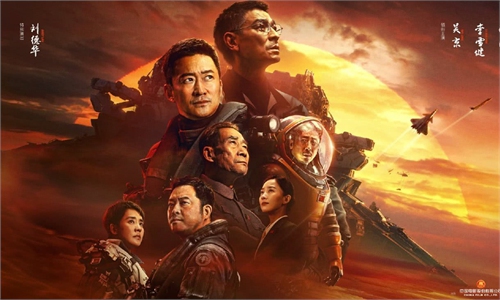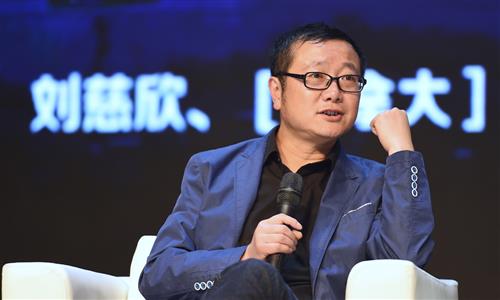ARTS / CULTURE & LEISURE
Chinese sci-fi literature leader Liu Cixin ponders humanity’s future with AI
Staying optimistic
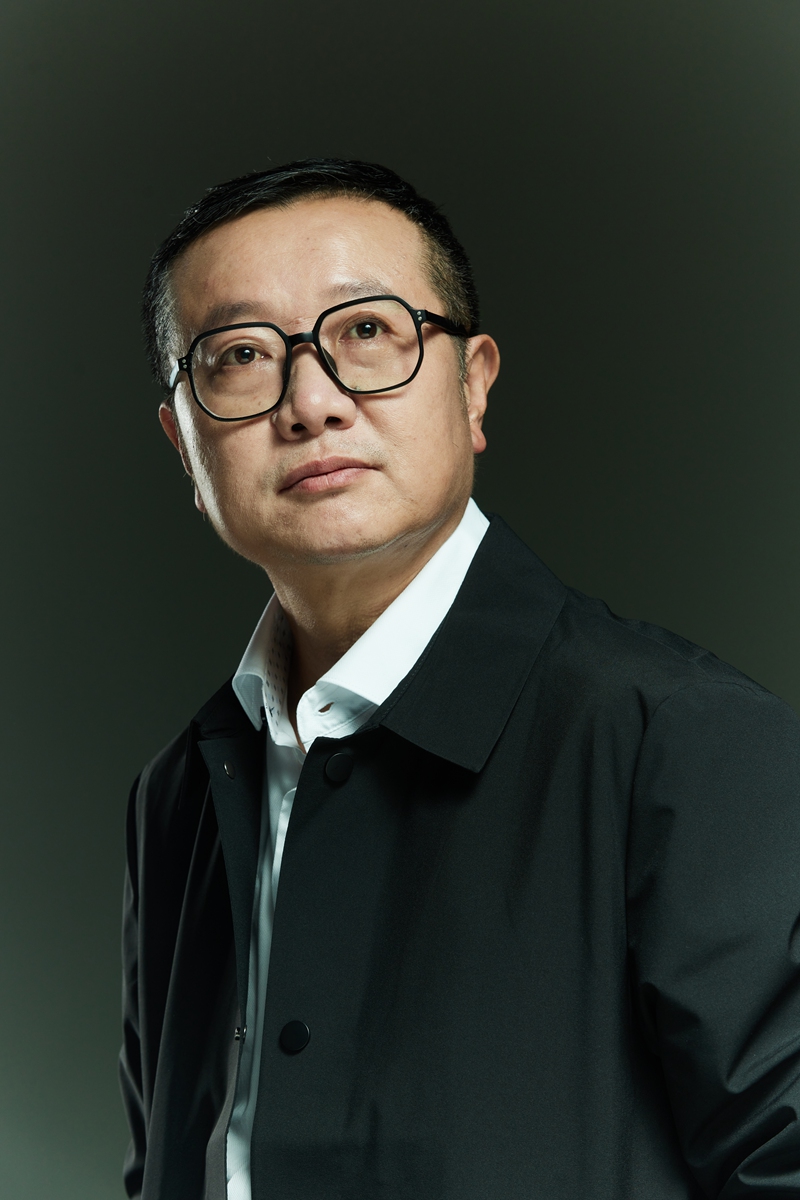
Liu Cixin
Editor's Note:
A sci-fi film adapted from renowned science fiction writer Liu Cixin's novel The Longest Fall made its debut at the eighth China Science Fiction Convention on April 27. Since The Wandering Earth was first made into a sci-fi movie in 2019, every time Liu's works have been adapted into a film or drama series, they have become online cultural spectacles sparking enthusiastic discussions.
Liu and his award-winning works have undoubtedly contributed greatly to the rapid rise of Chinese science fiction literature and films. So, how has Liu's ingenious pen given birth to the flower of science fiction? What differences exist between his works and Western science fiction? How does he walk a path of innovation? Liu recently shared his insights with the Global Times on these questions.
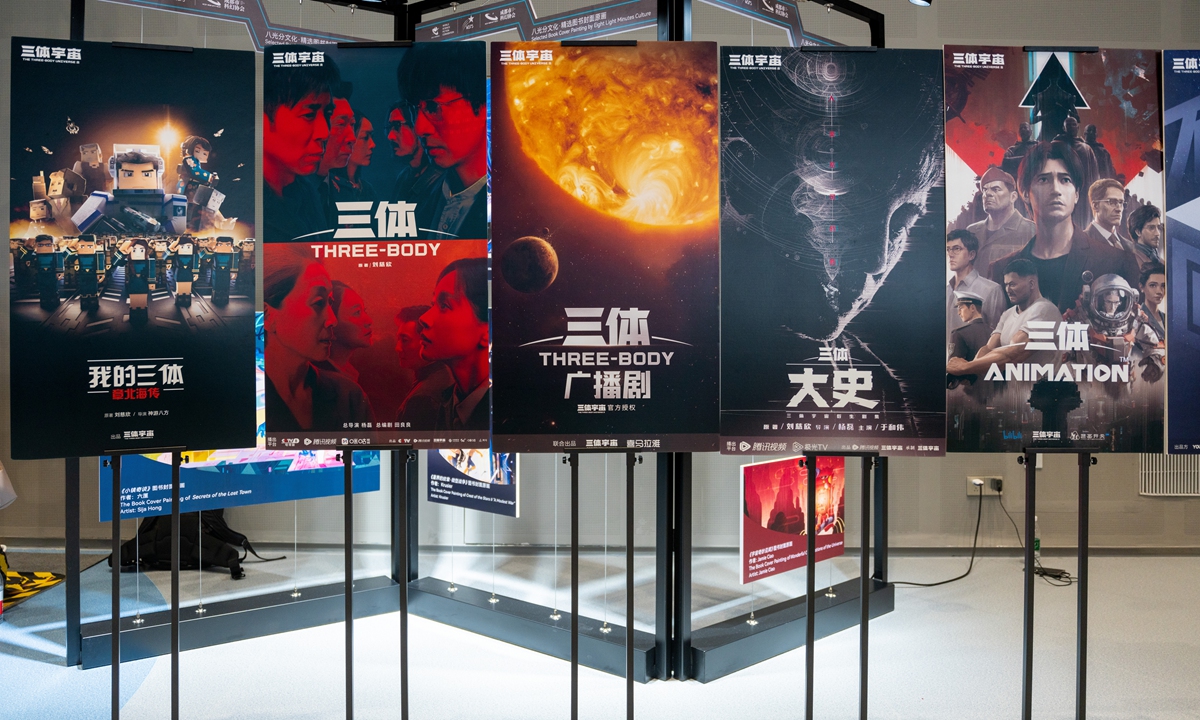
Various media products based on Liu Cixin's The Three-Body Problem Photo: VCG
Science fiction writer Liu Cixin is ready to see AI change human lifestyles and even human society in general. He may explore the subject of the recent AI onslaught in his own sci-fi works, but predicts that sci-fi writing could also be overturned, even taken over, by AI.Enjoying high prestige as a leading science fiction writer - even before his landmark win of the Hugo Award for the novel The Three-Body Problem - Liu has been widely seen as a trendsetter in the Chinese sci-fi scene.
Some say Liu "single-handedly" lifted Chinese sci-fi to a world-class level. This is not without basis, as seen from the novel's high-profile global readership, which includes Barack Obama, and the popularity of Netflix's latest adaptation of The Three-Body Problem trilogy. In fact, Liu's works had won a number of awards in China since the 1990s, but it was his Hugo Award win - the first win for an Asian writer - that made his novels and the sci-fi genre household names in China.
Chinese sci-fi became even more popular after Liu's The Wandering Earth was made into a sci-fi movie in 2019.
The popularity of sci-fi reached a new milestone when the World Science Fiction Convention was for the first time held in China - in Chengdu, Sichuan Province - in 2023.
In a country where traditional swordsman novels and immortal fantasy had long dominated the reading and TV scenes, and sci-fi films in cinemas used to be almost exclusively Hollywood productions, Chinese sci-fi may not have ascended so quickly to "mainstream" status, on par with the other genres, without Liu and his works.
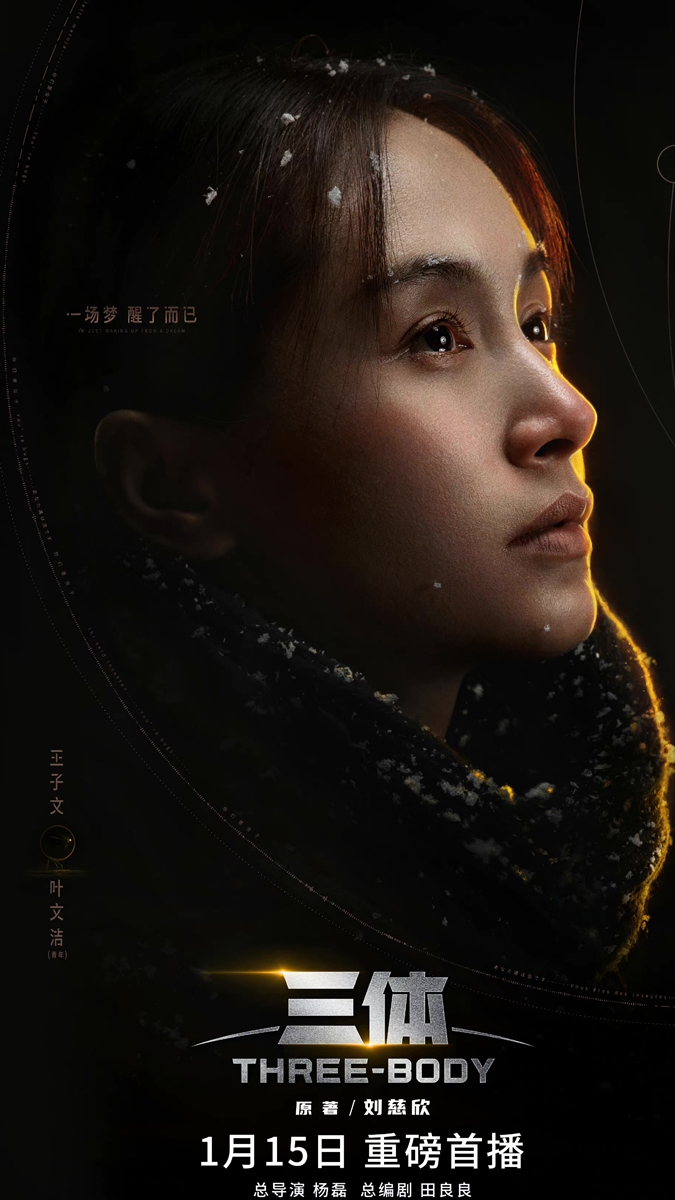
Ye Wenjie from Chinese TV series Three-Body Photo: VCG
Staying inspired amid era of AIOn a typical day, Liu writes and attends to other tasks during the daytime, while his evenings are reserved for reading and watching movies and TV shows. Writing, he said, is not just a job for him but a passion and has become a form of spiritual solace.
Liu admitted that he doesn't have many other interests. He enjoys activities like sports, traveling, and watching movies, but wouldn't necessarily call them hobbies. Looking ahead, Liu revealed that he has been working on new projects but has yet to produce much with which he is satisfied. He expressed his desire to write novels that are different from previous works.
When asked about how he comes up with such unimaginable future technologies and ideas in his works, Liu said the rapid development of technology and the mysteries of nature revealed by cutting-edge technology have been endless sources of inspiration about the future and the universe. He noted that the future technologies in science fiction are based on modern technology and are extensions of it.
As AI-generated content has increasingly become a major trend in society, Liu also began pondering the topic after seeing the significant development of AI over the past few years and its gradual integration into the lives of ordinary people.
The AI onslaught has already started to change the world, including Liu's life. He said he does use generative AI, but not extensively yet. However, he said this may change. If AI continues to develop at its current speed and trend, it may greatly intervene in the creation of sci-fi literature, bringing about significant changes.
Liu said AI will have a profound impact on humanity in both the short and long term. In the short term, AI will replace human work in many fields, requiring society to adapt to the situation. In the long term, the intelligence of AI may approach or even surpass that of humans, leading to profound effects on human lifestyles, social forms, and ways of understanding the world. He hopes his future works can explore this theme, but acknowledges that as a sci-fi writer, he may also be replaced by AI, leaving whether he will have the opportunity to do so uncertain.
Indeed, Liu's sparks of inspiration come from the development of modern technology and its impact on humanity, like the cosmic images revealed by modern science. For Liu, he doesn't have a specific method to stimulate the generation of ideas, and so considering the goings-on of today, AI seeping into people's lives could be the perfect subject.
Liu shared that he has also been inspired by great authors like Arthur C. Clarke, who had a significant influence on him. For more contemporary authors, Liu recommended US writer Andy Weir. He praised Weir's works such as The Martian for their richly imaginative stories founded on technology.
Limitless imagination
One of the impressions readers have of Liu's works is that many of his novels, represented by The Three-Body Problem, share the theme of "saving the world." In response to this perception, Liu told the Global Times that he is a firm optimist when it comes to the future of humanity. He said the future of humanity is bright but also acknowledges the challenges and pitfalls that lie ahead on the path to that bright future. He emphasized the importance of continuous scientific and technological development, as well as maintaining a spirit of exploration and progress, rather than becoming complacent with the comforts of life on Earth.
As a literature genre originating and prospering in the West, sci-fi has been quickly expanding in China in recent years thanks to the efforts of authors like Liu. But how different are the works in China and what new ideas can Chinese sci-fi bring?
Since the release of The Wandering Earth series in cinemas, many viewers have applauded the different approaches when it comes to saving the world, showing the importance of different countries and organizations working together instead of focusing on the individual heroism seen in Hollywood films.
Regarding the idea that his works advocate Chinese values, Liu said he doesn't intentionally incorporate Chinese cultural elements into his works. He emphasized that the crises and disasters depicted in his novels are challenges faced by all of humanity, and the actions taken to save the world are a collective effort. This sheds light on his belief in the potential for a bright future for humanity, as long as we continue to make the right choices and strive for progress.
Despite the achievements of The Three-Body Problem, according to Liu, the sci-fi genre is still in need of further development. Liu pointed out that compared to mainstream literature, there are relatively fewer influential sci-fi writers and works in China. He emphasized the importance of strengthening original content as the foundation for the further advancement of sci-fi in the country.
Sci-fi is a genre that is inherently linked to technological advancements. Liu said that while technological advancements in real life provide rich story inspiration, they can also exert great pressure on sci-fi creation. High tech, especially information technology, has quickly entered into and changed ordinary lives, and therefore has led to a decrease in the sense of wonder and mystery surrounding technology, posing a challenge for sci-fi writers who rely on technological marvels in their storytelling, Liu told the Global Times. As technology continues to reshape our world, sci-fi writers constantly need to find new ways to captivate readers and push the boundaries of imagination in their storytelling.
'Futurology' education
Liu also shared with the Global Times his thoughts on the role of sci-fi literature in today's society and its impact on people's thinking and beliefs.
For Liu, sci-fi plays a crucial role in popular literature, stimulating imagination, expanding the scope of thinking, and showcasing strong innovative elements.
He emphasized the importance of "futurology" in education and cultivating an audience for the genre among young students. Not only are there a growing number of readers of sci-fi novels among young people, but also a significant audience for sci-fi films and TV shows.
Sci-fi enriches the younger generation's imagination and inspires their innovative and exploratory spirit. Liu said that by exposing young readers to the future's various possibilities, sci-fi literature helps them to envision and navigate the complexities of tomorrow.
For those people aspiring to become sci-fi writers, Liu emphasized that the ability to create stories is closely related to the author's worldview, which should extend beyond the narrow confines of the personal emotions of everyday life.
"Sci-fi focuses on human civilization against the backdrop of the universe. Authors should not be immersed solely in their personal emotions in mundane reality, but should have a broad perspective, maintain curiosity and awe toward the universe, and also pay attention to the fate of humanity and the future of Earth's civilizations," he said.
While sci-fi literature is gaining traction, the actual market for it is still relatively small.
In such a scenario, Liu advised young individuals that it is best to start writing sci-fi as a hobby rather than a full-time profession, encouraging them to venture into the world of sci-fi while also balancing their passion with practical considerations.

